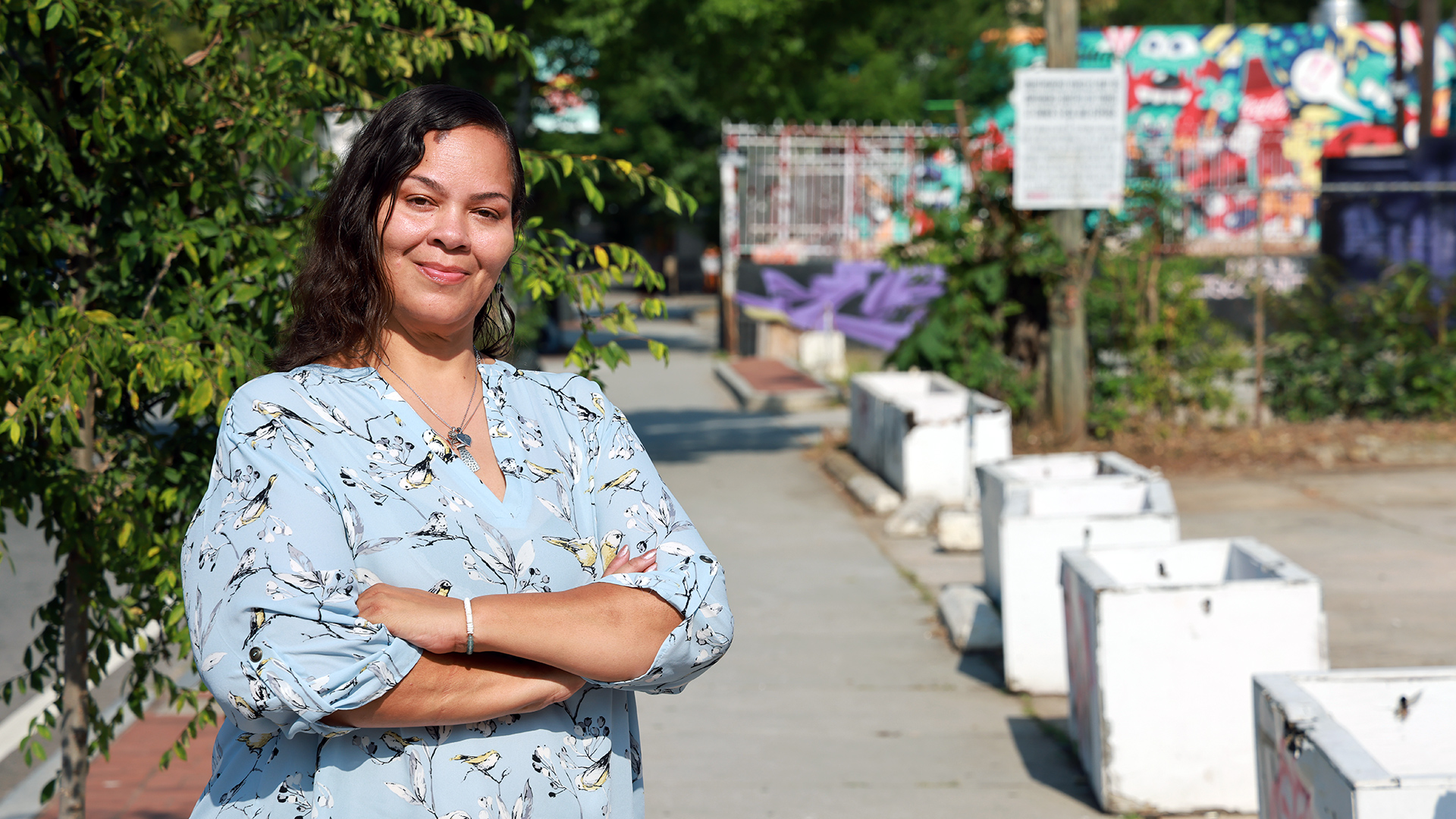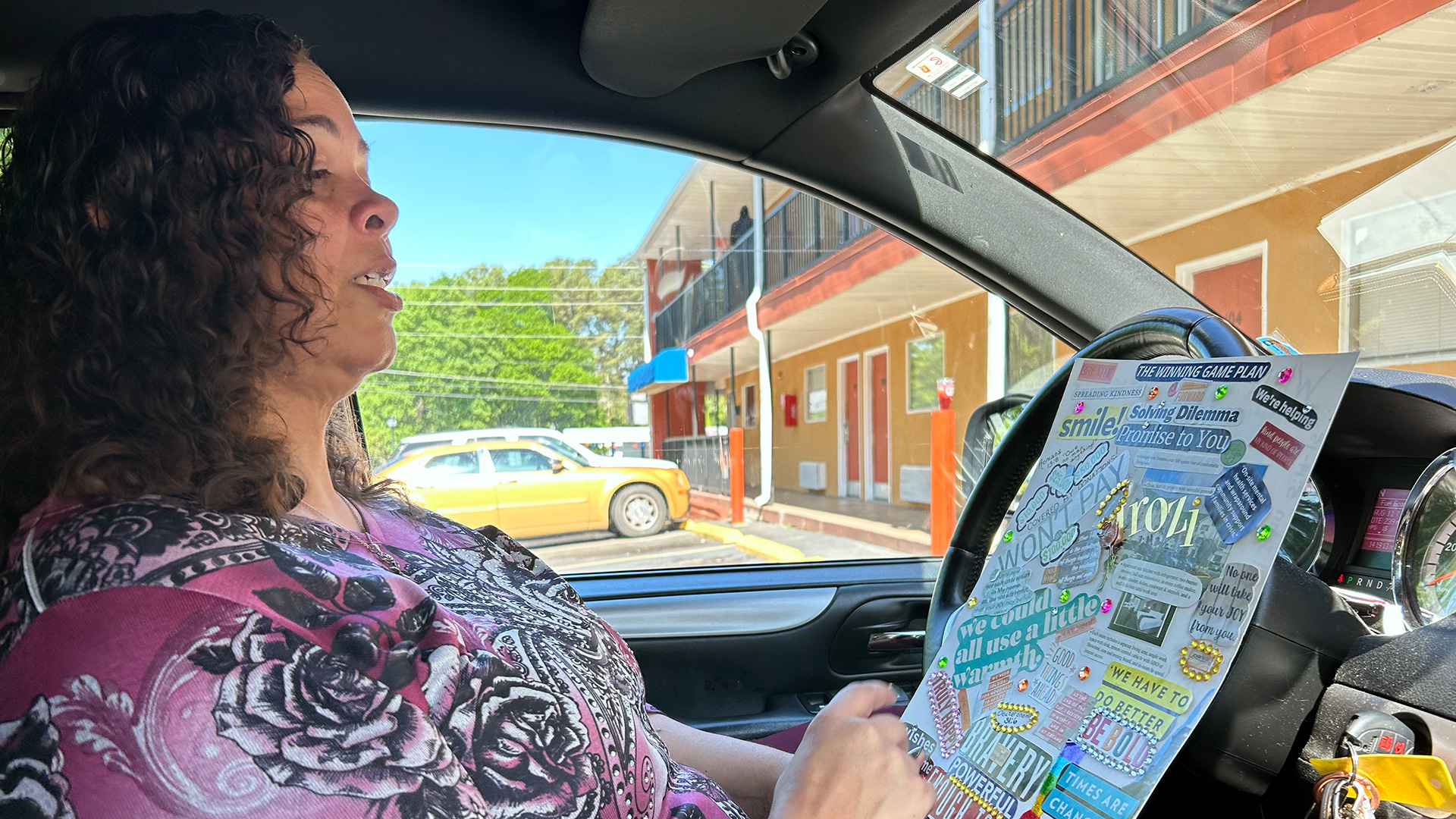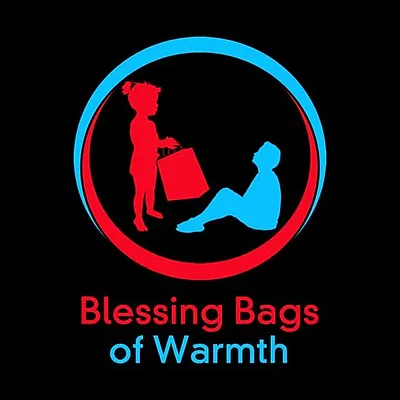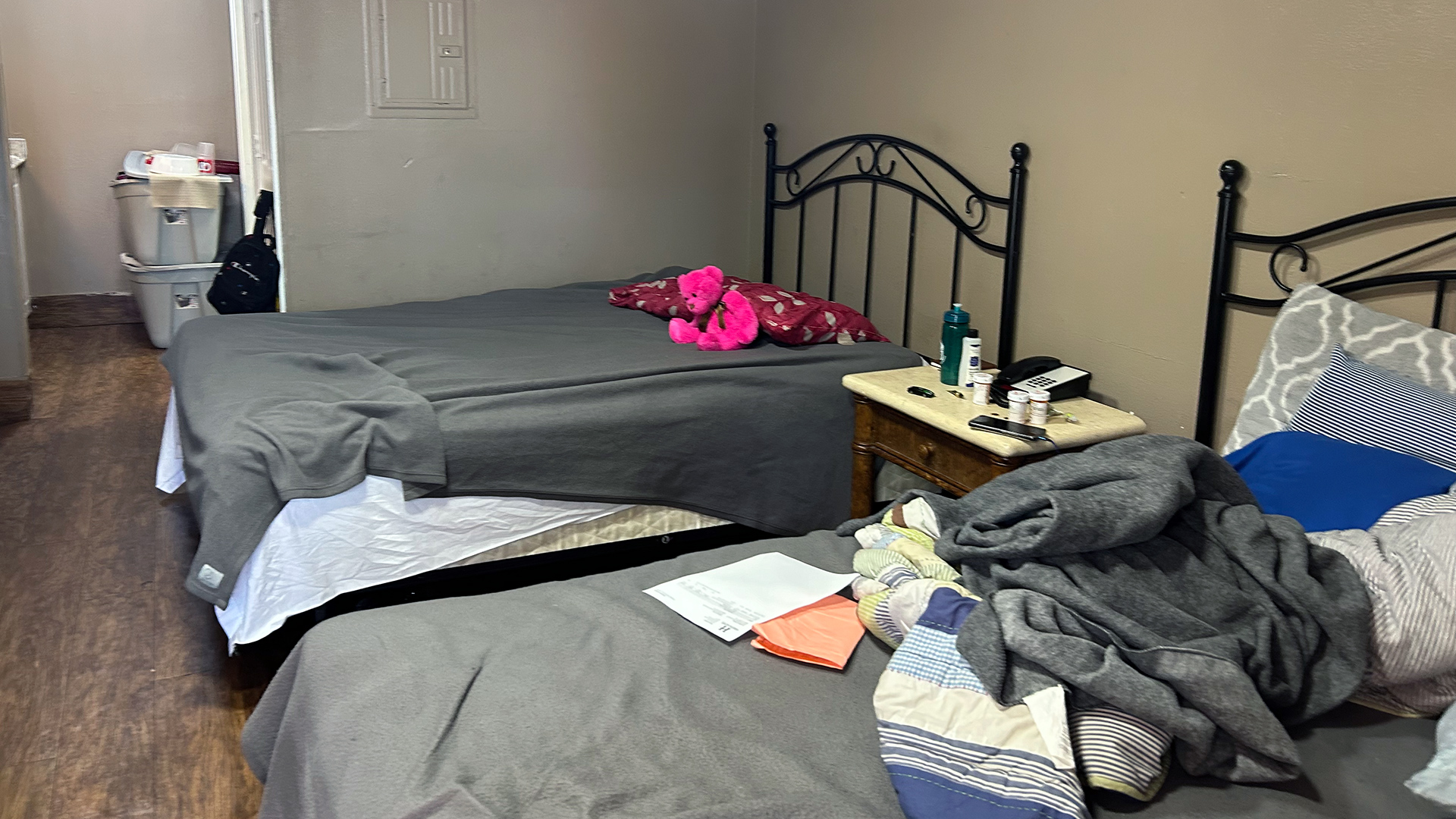
Grace Beyond Her Ability
Sherri McCoy’s service to the unhoused people of Atlanta is an exercise in radical selflessness.
On Thanksgiving Day 2020, when families were canceling traditional gatherings and hunkering down at home because of a pandemic, Sherri McCoy and her daughter Rose, then eight, took to the streets of Atlanta, Georgia.
Sheri had prepared a feast and packaged meals to deliver to close relatives in the area. She still had enough food for about forty more people.
“Rose!” she called out to her daughter. “We’re gonna go find our friends under the bridge and if there’s not forty people there, there’s a couple of other places that Mommy knows downtown. Let’s see if we find anybody else.”
Sherri had always been community-minded, taking Rose to volunteer events since she was a toddler. The two loaded the warm food into Sherri’s Subaru and headed for an encampment of fifty tents under a bridge in downtown Atlanta. As soon as Sherri parked her car, Rose hopped out.
“Get that baby back into the car,” came a yell from one scruffy man. Rose ignored him and began unloading containers of oxtails, turkey, ham, boiled corn, mashed potatoes, pecan pie, and more.
“I’m homeless. What do you mean, how was my Thanksgiving? I’ve been out here.”
“How was your Thanksgiving?” Sherri asked the men and women, who seized the cartons as fast as she could hold them out.
"I’m homeless. What do you mean, how was my Thanksgiving? I’ve been out here,” growled one man, before allowing a smile to spread across his face. “But it got better today.”
After everyone had taken all the food they could carry, Sherri and Rose packed up. Then a man shuffled over and asked Sherri if they had any blankets. Rose darted to the back of the car, retrieving a Vera Bradley floral-printed quilt that was Sherri’s favorite.
“Mommy, can we give him this?” Rose whispered loudly. Sherri sighed and murmured a hesitant yes, watching as Rose handed the man the designer blanket. He wrapped it around his shoulders and grinned so widely Sherri could see where his teeth should have been.
More of the encampment’s residents requested blankets and other supplies, but all Sherri and Rose had in the car was a picnic throw. They gave that away, too, before reluctantly saying goodbye.
As they drove away from the camp, Sherri noticed Rose wiping her flushed wet cheeks.
“Baby, what’s wrong?” she asked her daughter.
“We need more blankets,” Rose said softly.
Rose’s observation morphed into a plan to stuff forty backpacks with blankets, hand warmers, snacks, and hygiene kits. Rose donated her own money to the effort—the $200 her grandma had sent her for Christmas to buy a dollhouse she had pined over for months.
On each bag, Sherri and Rose tied a “blessing tag” with a hopeful message for its recipient. As soon as they’d handed them all out, Rose told an astonished Sherri, “I can’t wait to do this again next weekend.”

What Rose didn’t realize was how sparse money was for her mom.
“Rosie knew we lived with her grandpa, but she didn’t realize we were technically homeless ourselves,” Sherri says.
From her daughter’s perspective, Sherri had always found a way to provide for her and help others. This time would be no different.
Rose named their endeavor Blessing Bags of Warmth for the Homeless. A local graphic designer quickly signed on to create the organization's logo. For inspiration Sherri sent him a photo of Rose handing a man one of the backpacks, along with Rose’s art direction.
“I knew I wanted the homeless man to be colored blue, which shows he’s cold,” Rose explained. “And I am red, which represents warmth. The warmth curls around the blue and the blue curls around the warmth.”
Fulfilling the organization’s mission quickly became Sherri’s full-time job. It’s a demanding position that doesn’t pay well, or sometimes at all. Sherri and Rose’s father, Jameen Robbins, are no longer a couple, but they continue to live and co-parent in Jameen’s father’s house in East Atlanta, most months just scraping by.
Rose is the reason that four years after that memorable Thanksgiving, Sherri continues to spend most days riding a circuit: dropping off food, checking on unhoused residents, attending community meetings, and documenting her days on social media. It was not the first time Rose had unexpectedly changed the direction of Sherri’s life.

Sherri was born on a military base in Germany and was adopted by a couple who moved her to West Atlanta when she was three years old. They divorced a few years later and her mother took custody of Sherri. Custody, however, is not the same as care. According to Sherri, her adopted mother suffered from untreated mental illness, and Sherri endured horrifying emotional and physical abuse.
When Sherri was eleven years old, around the same age Rose is now, a middle school physical education teacher noticed fresh bruising and deep welts along her legs and alerted the authorities. Sherri was removed from her mother’s home and went to live with her adoptive father and his second wife, where she stayed on and off before graduating high school in 1994.
She married Scott Buford in 2005, and while they tried to have a baby of their own, Sherri instead had repeated miscarriages, by her count thirteen in total. Scott eventually died from asthma-induced heart failure in 2010. He took his last breath in Sherri’s arms.
Sherri sank into depression and developed debilitating migraines after her husband’s death.
“Right after Scott died, I seriously contemplated suicide,” Sherri tells me while sipping a hot mocha on the patio of a local coffee shop. “I thought, ‘I’m tired. My husband’s gone. I’ve had all these miscarriages. I don’t have any children who need me. I don’t have a reason to be here.’”
“Right after Scott died, I seriously contemplated suicide. I thought, ‘I’m tired. My husband’s gone. I don’t have any children who need me. I don’t have a reason to be here.’”
One warm evening after leaving an office job she despised, Sherri put her plan into action. Collapsing into the driver’s seat, she rolled down her car windows and steered it instinctively towards Plus Size Clothing Recyclers, a trendy thrift shop she had visited before. Her goal: to select an outfit to kill herself in.
“I wanted to be cute when I was found,” she says with a wince, remembering the day.
Escaping behind the thin door of the store’s air-conditioned dressing room, a cheerful voice rang out from the storeroom, “Be sure to come out and show me that first dress!”
The voice belonged to LeToya Turner, the shop’s owner, who quickly convinced Sherri to participate in what she called a “fitting room fashion show.” As Sherri tried on outfit after outfit, LeToya hyped her up—“You are gorgeous! Work it, girl!”—all the while snapping photos of Sherri as the two women talked about their lives and the change they wanted to see in the world.
Encouraged by LeToya’s positivity, Sherri did not take her life that night. Instead, their friendship flourished, with Sherri finding and donating mounds of clothing to LeToya’s shop in the months following her darkest hour.
Sherri continued to find comfort in her small circle of friends, including LeToya and Jameen Robbins, whom Sherri briefly dated before realizing her feelings for him were tender, but not romantic.
Five months after Jameen and Sherri decided to stay friends, Sherri received shocking news from her doctor. She was twenty-three weeks pregnant with a baby girl. Two weeks later, Rose Marie Eva Louise Robbins entered the world weighing only one pound and eight ounces.
Rose was considered a micro preemie with a slim chance of survival, but like the mother who birthed her, she was a fighter.

On a Thursday afternoon in April, Sherri swings her maroon Dodge Caravan into the parking lot of Connect Church in Decatur, Georgia, where she regularly attends and volunteers. The next service isn’t scheduled until 10:30 a.m. the following Sunday, so the normally lively church sits empty and dark.
Unlocking the door, she switches on half of the community room’s overhead fluorescent lights, exposing a line of folding tables stacked high with boxes of non-perishable food items—Dum-Dums suckers, cartons of bone broth, mayonnaise bottles, Ghirardelli hot chocolate, green canisters of powdery parmesan cheese.
Sherri grabs an empty box and gets to work, loading it thoughtfully with items from the table, while talking about her relationship to religion and her motivation to continue her work in the community.
“I believe in a greater power, but I don’t think who you serve matters,” she tells me, hoisting the box onto her hip and moving briskly towards the church’s storeroom. “It’s how you serve.”
Sherri is a statuesque woman. She stands a curvy 5’11” and has broad shoulders and long, graceful arms she frequently wraps around people who need hugs. She totes heavy loads with equal ease. She has deep brown eyes, warm umber skin, and tight waves of curly hair she pushes behind her ears as she skillfully selects foods for an assortment of healthy meals and sugary snacks. At age forty-eight, she radiates both kindness and authority.
Sherri explains she is one of a small team of volunteers that runs the church’s food pantry, where they serve fifty to seventy families each month. This morning she’s pulling together groceries for Adriane, a pregnant mom and her ten-year-old daughter, Aria, who are staying at the Haven Inn, a dingy, extended-stay motel five miles south. Sherri is helping Adriane pay for her room while she works to get the mother and daughter admitted into a shelter with a rehousing program.
Adriane met Sherri the way many people facing homelessness in Atlanta do—on social media. Sherri moderates the Facebook group End Atlanta Homelessness, an active page with 8,500 members. Four months ago, Adriane posted there looking for a pair of pants to wear to a job interview at McDonald’s.
As we pull up to the two-story mauve and tan motel, she confides that she currently owes $19,000 across three credit cards. Only one of her cards has funds available. “And that’s just because I can’t find it,” she laughs.
“People were commenting on her post, ragging on her about not being able to come up with $10 for pants,” Sherri remembers, topping the box with a bag of romaine lettuce and some broccoli florets. “I deleted all the negative comments and messaged her, asking for her size.”
After that, Sherri became Adriane’s go-to person for support and comfort as her circumstances went from difficult to dire. Once Adriane got pregnant, her morning sickness interfered with her shifts at McDonald’s. Then her cousin got evicted from the apartment where Adriane and Aria were staying. The final blow came when her fiancé was arrested for violating probation.
Sherri’s van, now loaded up with groceries, curves around Wesley Chapel Road toward Adriane and Aria’s motel. As she drives, she tells me they are one of four families she is currently assisting. There have been roughly 5,000 others since 2021, when she launched Blessing Bags of Warmth for the Homeless as a nonprofit organization.
Sherri continues to solicit donations online, snapping photos that promote her work and the need for more community donations and involvement, but when social media posts don’t do the trick, she opens up a new credit card account, maxing it out with grocery store runs, extended stay hotel bills, and the endless swipes at gas station pumps that allow her to get across the city. She pays these bills back as donations and grants come in, but she is always nagged by debt.
As we pull up to the two-story mauve and tan motel, she confides that she currently owes $19,000 across three credit cards. Only one of her cards has funds available.
“And that’s just because I can’t find it,” she laughs.
Sherri parks her van in front of a dented red door that displays a room number and a no-smoking sign. Adriane is outside, pacing the stained concrete walkway. Sherri follows her through the door and hoists the box of groceries onto a small dresser just inside. The room has two double beds, bare gray walls and a small kitchenette in the corner equipped with a mini-fridge, microwave and stove top.
“I brought you some ground turkey and noodles so you can make spaghetti,” Sherri tells her cheerily.
“Oh, good,” Adriane says. “I just made a pot of spaghetti the other night and it was so good. I shared it with the neighbors next door, too.”
Sherri asks Adriane how she’s been and what the crowd has been like around the hotel. The first week of their stay, Adriane and Aria were awakened by loud bangs of gunfire in the middle of the night.
“Dope dealers stand over there playing loud music and smoking weed,” Adriane says,
nodding towards the motel’s large parking lot. “If I have trash, I walk it to the dumpster with my neighbor. It’s bad when you can’t really step out your door like that.”
Adriane worries about Aria’s safety, and she worries about Aria worrying. The girl’s fifth-grade teacher recently called about helping Aria find a way to attend the class trip to Tennessee. When Sherri asks if Aria wants to go, Adriane says no.
“She really don’t want to leave me,” Adriane says. “I want her to enjoy herself, but I don’t want her to leave me alone here either.”
Sherri promises Adriane that she’s working to find a transitional program that can help them apply for housing. She assures her that if Aria goes on the trip while they’re still at the motel, she’ll check in more often.
“You don’t want Aria to look back one day and say, ‘I couldn’t go to my fifth-grade trip because we were living in a motel,’” Sherri says. “You want her to be like, ‘I went on my trip even though we were in a motel.’” Adriane nods, but she doesn’t look convinced.

On the ride home, Sherri talks about the difficulties of getting the mother and daughter placed into a thirty-day shelter with a rapid rehousing program and job training. She has reached out to some bigger organizations like Atlanta Mission and the Zaban Paradies Center and is waiting to hear back about Adriane’s eligibility.
“The system is not set up for a lot of people to succeed,” she sighs. “Many of these programs require proof of income that’s more than two times the rent of the apartment they’re placed in. Even after Adriane gets past the first trimester and can work again, it will be hard for her to make enough.”
Atlanta has the highest income inequality among large U.S. cities, according to the U.S. Census Bureau. The nonprofit organization Partners For Home estimates that 2,679 unhoused people were living in the Atlanta area in 2023, up from 2,017 unhoused residents in 2022.
Cathryn Vassell, CEO of Partners For Home, says the research clearly shows that scarcity of affordable housing drives homelessness. The less affordable housing there is, the more people are driven to homelessness.
Vassell agrees with Sherri that securing housing can be difficult for many Atlanta residents facing homelessness. “It's always struck me as fascinating that we put homeless people through these hoops and hold them to a higher standard to qualify for housing.”
While the odds might be stacked against Adriane, Sherri has witnessed people in similar predicaments recover and thrive with her support. One example is Nikki Sampson, a woman Sherri worked with a year earlier.
“Why we can’t go home, Mommy?” they asked their mother. “Why we ain’t at home?”
“This wasn’t our home in the first place,” Nikkie responded.
Nikki, her husband Terrey White, and their three young boys had no secure place to live for months, but as they slogged from relatives’ homes to budget hotels to their car, they saved enough money to make a deposit and pay the first month’s rent on a house. Nikki found what looked like their dream home on Zillow, reached out, and got a reply from a man who said he was the property manager. She toured the house on her own and promptly signed a lease, handing over nearly $3,000 to his associate whom she met at a local coffee shop.
That’s when a frantic Nikki reached out to Sherri. Hours after the family moved into the Clayton County house, the real property manager showed up and told them they had been scammed and had one week to move out.
Nikki’s three sons, who thought they were finally settled in a small, but safe space of their own, didn’t understand why their mom was repacking moving boxes and loading them into Terrey’s work truck.
“Why we can’t go home, Mommy?” they asked their mother. “Why we ain’t at home?”
“This wasn’t our home in the first place,” Nikkie responded.
Sherri alerted 11 Alive News and stayed by Nikki’s side as reporter Tracey Amick-Peer interviewed the distraught mother for a segment that aired that evening at 6 p.m.
She set up a Go Fund Me page and took to social media, eventually raising enough to secure an extended stay room for the family of five and give them back a portion of the money they were scammed out of.
Sherri wanted to do more. But despite her many calls to property managers and tireless outreach to individuals and groups, she was unable to locate a home Nikki’s family could afford.
Her frustration peaked after weeks of trying—and failing—to find the family housing. In the parking lot of the extended stay, she shot a selfie video pleading with the community in an unusual display of heated irritation. Sherri’s voice trembled as she waved the hotel bill in the air and howled with anger into her phone’s shaky camera.
“I can’t help but feel like I failed them,” Sherri told her thousands of followers. “Y’all! Somebody can see this post and help me find them a house, two bedrooms or more for $1,200 a month. Help me keep this family safe and out of a hotel and out of homelessness.”
Her voice cracked loudly as she abruptly ended the video. The day after she shared her rant, she was worried about how it would land.
“I’m kind of kicking myself for posting it,” she said afterward. “I’m like, maybe I should delete that because I almost look like—and I hate this term—an angry Black woman.”
Sherri didn’t delete the post. After raising only a couple hundred more dollars, she eventually connected Nikki to other organizations and resources. She talked to a potential employer on Nikki’s behalf and when Nikki landed the job, Sherri asked for donations of professional clothing for the newly employed mom.
The last time Sherri spoke to Nikki, her family was living comfortably in an apartment in the Greenbriar area of Atlanta.
“Those are the updates I like to hear,” she tells me. “All the work I put into those three months with them was worth it.”

A vision board Sherri recently created now lays across her van’s dashboard, sliding down the slick black surface when she makes a quick turn. It’s a collage of magazine cuttings, press-on rhinestones and words etched in permanent black marker. Colorful headlines in playful fonts with sayings like, “We could use a little more warmth” and “We have to do better,” pasted next to Bible verses and dollar amounts in the tens of thousands.
The board represents what Sherri wants to accomplish personally and with Blessing Bags of Warmth. Her dreams include opening her own version of an extended-stay that is safe, affordable and designed for people experiencing homelessness.
High on her must-have list for the imagined hotel rooms are full-sized refrigerators to give unhoused residents plenty of room to store fresh, healthy foods.
Sherri knows these dreams are aspirational, and she also has more concrete objectives for her organization. Once she helps the families she’s currently working with get on more stable ground, she plans to cut back her outreach and spend three months fundraising. Her goals are practical. She wants to pay back the debt she’s accrued and have $10,000 in the bank that she can pull from as needs arise.
Cathryn Vassell tells me small organizations like Sherri’s are essential to a homeless problem that continues to grow in numbers and complexity.
“I think there's great value in what these [smaller] organizations do. We need many, many hands and feet that are helping in this system and helping people who are down on their luck and need assistance. It can be lifesaving.”
“I think there's great value in what these [smaller] organizations do,” Vassell said. “We need many, many hands and feet that are helping in this system and helping people who are down on their luck and need assistance. It can be lifesaving.”
Longer term, Sherri plans to broaden the organization’s board which is currently comprised of her personal friends and associates. She hopes to eventually hire an accountant and develop an actionable business plan for Blessing Bags of Warmth for the Homeless. But as a team of one, finding the time to develop a burgeoning nonprofit can feel next to impossible.
As we pull back into the church, where Sherri will gather more food for families and spend time organizing the clothing donation closet, she reads me the first few lines of a recent message submitted by a local mother to the organization’s website: “I’m in need of hotel assistance. I have an eight-year-old son and I'm just trying to get my room covered only for today.”
“The me with access to funding would gladly pay the eighty bucks for her room,” Sherri tells me. “Matter of fact, let me pay it for a week to give her some breathing room.”
Instead, she responded that she isn’t taking new clients at this time.
“I don’t like sending that reply, I really don’t,” she says. “I didn’t even read her whole message because I know if I do, I’m going to call up Capital One and ask them to send me a replacement card and I’m going to use it to pay for that momma’s room.”
About the author
Mercedes Kane is a writer and documentary filmmaker living in Atlanta. Her most recent film, Art and Pep, is available to stream on Peacock. She will receive her MFA in narrative nonfiction from the University of Georgia in August 2024.


I’ve seen the tireless work Sherri does in the community through various Facebook groups. Donations of any and every size help so much! https://www.paypal.com/us/fundraiser/charity/4345001